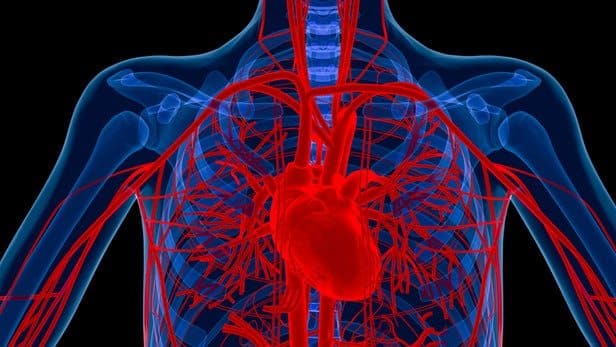Antioxidant MitoQ Reinvigorates Aging Blood Vessels
An antioxidant specifically engineered to seek out the mitochondria within cells may help reverse the aging of blood vessels, reducing the risk of heart disease, according to a new study by the University of Colorado Boulder.
Impaired endothelium‐dependent dilation (EDD), largely caused by reduced nitric oxide (NO) bioavailability secondary to increased oxidative stress, is an important clinical manifestation of endothelial dysfunction.
To keep the body healthy, blood vessels must be able to dilate and contract as needed. When dilation is required, the endothelium (a thin layer of cells lining the blood vessels) produces a chemical known as nitric oxide.
Nitric oxide is highly vulnerable to destruction by free radicals, however- particularly the free radical superoxide, which is actually produced by the body’s own mitochondria. Superoxide also degrades one of the enzymes that functions as a precursor to nitric oxide, leading to even lower levels of the chemical and decreased dilation of blood vessels. This, in turn, increases the risk of heart disease.
Superoxide is necessary to maintain cellular function, but as the body ages, mitochondria begin to produce it in higher quantities. At the same time, levels of antioxidants in the body often decrease with
age, which leads to even greater circulating levels of superoxide.Superoxide then begins to cause damage to the mitochondria themselves- which induces the mitochondria to produce even more superoxide, leading to even lower blood levels of antioxidants and more cellular damage.
But now, an antioxidant that targets cellular mitochondria appeared to reverse age-related vascular changes by 15 to 20 years in older adults, according to a small, first-in-human study.
The study used MitoQ, an antioxidant formed by adding a mitochondria-binding molecule to coenzyme Q10 (also known as ubiquinone or CoQ10). This is the first time scientists have examined how an antioxidant that targets mitochondria can impact vascular health.
In the course of their study, the scientists enrolled 60 to 79-year-old men and women from the Boulder area, USA. 50% of them took 20 mg of a chemically modified supplement called MitoQ while the other half took a placebo (MitoQ is made from natural antioxidant Coenzyme Q10, and it is made to adhere to mitochondria). The function of the blood vessel lining of the volunteers was then evaluated 6 weeks later. The aim of the researchers was to measure the dilation of arteries pertaining to increased blood flow.
Then, two weeks later, the two groups of participants swapped roles: the first one took the placebo instead of the MitoQ, and the other one took the supplement instead of the placebo. The same tests were repeated thereafter.
The findings show that the consumption of the supplement is linked with an improved artery dilation by 42%, making them comparable to blood vessels of individuals 15 to 20 years younger. This enhanced artery dilation is the result of a lowered oxidative stress. If this positive effect is maintained, the risk in heart disease is thought to decrease by 13%.
“Given that most (middle-aged and older) adults do not meet current guidelines for healthy lifestyle behaviors, MitoQ supplementation may represent an alternative or complementary pharmacological strategy for enhancing vascular endothelial function in this group,” the authors wrote.
MitoQ was found to decrease aortic stiffness among participants with high baseline levels. In addition, plasma concentrations of oxidized low-density lipoprotein (LDL)—markers of oxidative stress—were 13 percent lower after six weeks of taking the supplement.
“These findings establish the experimental basis for conducting a larger scale clinical trial in older adults or clinical populations, particularly those associated with endothelial dysfunction and elevated aortic stiffness,” the researchers wrote. “In the broadest terms, our results provide initial support for the idea that MitoQ, and potentially other mitochondria-targeted antioxidants, may be an effective treatment for improving vascular function and possibly decreasing the risk of CVD and other clinical disorders of aging, including cognitive dysfunction and chronic kidney disease.”
































